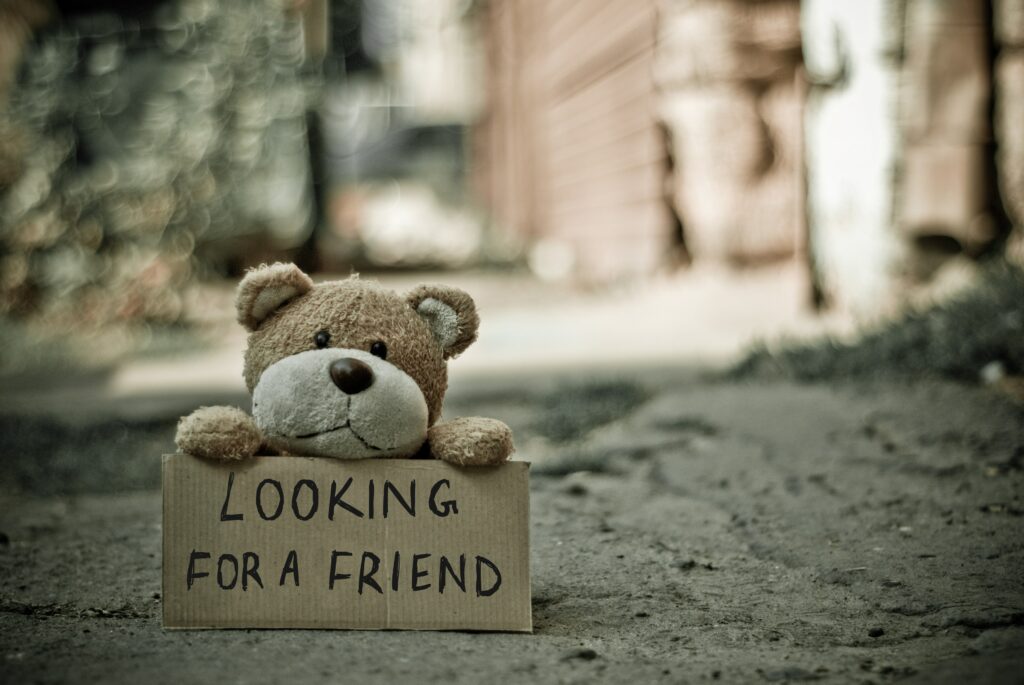
Context
During the Covid pandemic, the NHS became very concerned about mental health and devised guidelines so that people would better cope with loneliness. Loneliness is an unpleasant feeling of social isolation. As the song goes “all by myself, don’t want to be, all by myself anymore” and as suggested by the NHS guidelines, loneliness can be cured by connecting with others. In an article published in 2021 in the Journal of Marketing Research, Huang and Fishbach argue that the lonely may achieve this sense of connectedness with others through the consumption of reused products.
Research questions
Huang and Fishbach hypothesize that previously owned products hold some of their previous owner’s essence, and that lonely people are desperate to connect with others in both direct and indirect ways. The lonely could therefore indirectly connect with others through the consumption of reused goods. Therefore, the authors ask the following research questions: Do feelings of loneliness increase consumer preferences towards previously owned products? Why?
Method
To answer these research questions, the authors conducted 7 studies.
Studies 1 to 4 used natural levels of loneliness felt by consumer:
– Study 1 compared the proportion of lone customers entering a used VS regular bookstore in the same Hong Kong neighborhood among 378 customers.
– Study 2 was conducted on 120 students randomly chosen on campus, who were either sitting alone (lonely condition) or with another person (connected condition). Participants were asked to fill a questionnaire on an unrelated topic and had to pick a gift as a compensation for their participation from two boxes that were labelled “new pens” or “old pens”. This last manipulation constituted the true purpose of the study.
– Study 3 involved 120 MTurk participants who either had (connected condition) or did not have (lonely condition) a date for Valentine’s Day. Participants had to choose between purchasing used and new books at two different points in time: on Valentine’s Day and two weeks later.
– Study 4 tested the impact of chronic loneliness on the consumption of reused products during the Covid pandemic.
Studies 5 to 7 manipulated loneliness:
– Study 5 involved 777 university students and 201 MTurk participants. Participants evaluated an advertisement for a store that sold reused or new products. The advertisement mentioned loneliness (“These are lonely times. Want to feel less lonely?”) in the lonely condition or did not mention it in the neutral condition.
– Study 6 evaluated the role of need for social connection on consumption of used vs new products. 405 MTurk participants had to choose between a used or new book. Loneliness was manipulated by asking them to reflect on a lonely day (lonely condition) or on a typical day (neutral condition).
– Study 7 investigated the impact of the previous owners’ intentions on the consumption of used products by lonely consumers. It was conducted on 408 MTurk participants. Informants were asked if they would consider adopting a used tote bag instead of buying a new one. Some informants were told that the previous owner “gave” the tote bag, others were told that the previous owner “discarded” the tote bag.
Results
– Loneliness increases the preference for previously owned products compared with new products. For instance, in Study 1, 79,1% lone customers entered the used bookshop (vs 56,2% for the regular bookshop), while in Study 2, 78,1% participants sitting alone chose the used pen over the new pen (vs 57,1% of the participants sitting in pairs).
– Situational loneliness also increases the preference for previously owned over new products. For instance, on Valentine’s Day, lonely people chose more used books than connected people. Two weeks later, this effect dissipates. The effect of situational loneliness seems to be stronger than the effect of chronic loneliness on the consumption of reused goods.
– The effect of loneliness on the consumption of reused products stems from two facts:
(1) previously owned products carry the essence of previous owners and symbolically connect consumers with previous users,
(2) lonely people often seek social connection. However, they are usually bad at fostering direct social relations, which prompts them to turn to indirect ways of connecting with others, for instance, through the consumption of re-used goods.
The previous facts also imply that lonely people are susceptible to the previous owner’s intentions.
– The authors looked for alternative explanations for the effect of loneliness on consumption. However, they found no significant impact of nostalgia, comfort, price, or environmental concerns on the relationship between loneliness and the consumption of used goods.
Why is this article relevant for researchers?
First, from a methodological standpoint, this research is very interesting because the results are tested across contexts and sectors, which makes them very robust. Second, this article contributes to the literature on the consumption of reused products. This phenomenon is usually studied through motivational factors including social status, environmental concerns, exposure to certain normative appeals, willingness to pay (income, frugality…) or in terms of the giver’s characteristics. Indeed, previous works have investigated the act of giving up a used item from the giver’s point of view: for instance, in terms of how passing a possession onto someone else may ease the separation from the product, or how the previous owner can add value to the object (in the case of antiques or objects that were previously owned by celebrities). This article is original in the sense that it sheds light on the consumption of reused products from the current consumer’s perspective and characteristics. Third, the present research enriches the literature about the effects of loneliness on consumption. Namely, it confirms prior findings by showing how loneliness increases consumption of certain items because the lonely seek a sense of belongingness and approval.
Besides, this paper opens numerous avenues for future research. Future studies could explore the role of hope in consumption contexts affected by loneliness. Moreover, since the seller’s intentions seem to matter to lonely consumers purchasing reused goods, a potential extension of the present findings to recycled products or products that were given a second life could be studied. Future articles could also refine the understanding of the seller’s intentions and characteristics that could matter to the lonely buyer: maybe loneliness could even influence the consumption of reused goods from the seller’s perspective? Finally, this article highlights the importance of social connections in the consumption of reused good. Therefore, any context bringing out the need for connectedness between people should be further investigated.
Why is this article relevant for professionals?
This article provides professionals with new insight into motivations to consume previously owned products. It notably emphasizes the social connection of reused products, which is not a usual argument used by marketers. For instance, Beyond Retro favors environmental arguments by advertising “we hand pick every item of used clothing we find so you can shop sustainably”, while ThredUp tempts frugal consumers with promises to “shop like-new and used women’s clothes and kids’ clothes at up to 90% off estimated retail at our online thrift store and consignment shop”. This research could prompt managers from second-hand stores or activists advocating for sustainable consumption to highlight the sense of connectedness provided by previously owned products. These arguments could prove particularly efficient in contexts that favor loneliness (ie situation loneliness) such as Thanksgiving, Christmas or Valentine’s Day. Moreover, this article may also help healthcare professionals dealing with mental health issues, since reused goods may help cure situational loneliness by creating indirect bonds with others.
